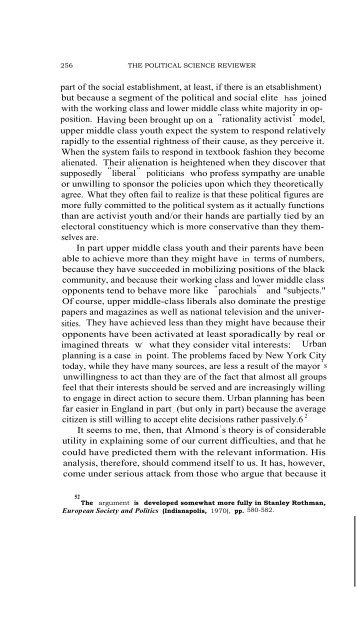FUNCTIONALISM AND ITS CRITICS - Intercollegiate Studies Institute
FUNCTIONALISM AND ITS CRITICS - Intercollegiate Studies Institute
FUNCTIONALISM AND ITS CRITICS - Intercollegiate Studies Institute
You also want an ePaper? Increase the reach of your titles
YUMPU automatically turns print PDFs into web optimized ePapers that Google loves.
256 THE POLITICAL SCIENCE REVIEWER<br />
part of the social establishment, at least, if there is an etsablishment)<br />
but because a segment of the political and social elite has joined<br />
with the working class and lower middle class white majority in opposition.<br />
Having been brought up on a " rationality activist " model,<br />
upper middle class youth expect the system to respond relatively<br />
rapidly to the essential rightness of their cause, as they perceive it.<br />
When the system fails to respond in textbook fashion they become<br />
alienated. Their alienation is heightened when they discover that<br />
supposedly " liberal " politicians who profess sympathy are unable<br />
or unwilling to sponsor the policies upon which they theoretically<br />
agree. What they often fail to realize is that these political figures are<br />
more fully committed to the political system as it actually functions<br />
than are activist youth and/or their hands are partially tied by an<br />
electoral constituency which is more conservative than they themselves<br />
are.<br />
In part upper middle class youth and their parents have been<br />
able to achieve more than they might have in terms of numbers,<br />
because they have succeeded in mobilizing positions of the black<br />
community, and because their working class and lower middle class<br />
opponents tend to behave more like " parochials " and "subjects."<br />
Of course, upper middle-class liberals also dominate the prestige<br />
papers and magazines as well as national television and the universities.<br />
They have achieved less than they might have because their<br />
opponents have been activated at least sporadically by real or<br />
imagined threats W . what they consider vital interests: Urban<br />
planning is a case in point. The problems faced by New York City<br />
today, while they have many sources, are less a result of the mayor ' s<br />
unwillingness to act than they are of the fact that almost all groups<br />
feel that their interests should be served and are increasingly willing<br />
to engage in direct action to secure them. Urban planning has been<br />
far easier in England in part . (but only in part) because the average<br />
citizen is still willing to accept elite decisions rather passively.6 2<br />
It seems to me, then, that Almond ' s theory is of considerable<br />
utility in explaining some of our current difficulties, and that he<br />
could have predicted them with the relevant information. His<br />
analysis, therefore, should commend itself to us. It has, however,<br />
come under serious attack from those who argue that because it<br />
52<br />
The argument is developed somewhat more fully in Stanley Rothman,<br />
European Society and Politics (Indianapolis, 1970), pp. 580-582.
















